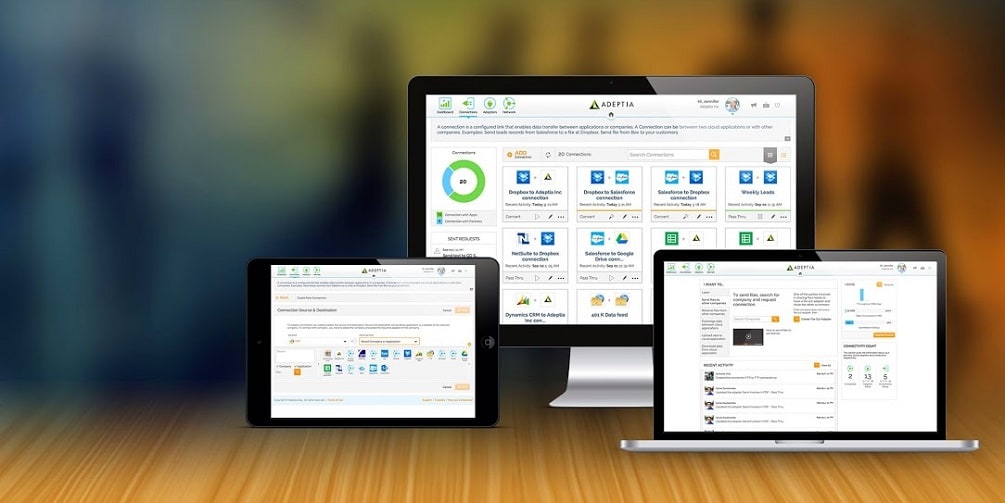Adeptia provides a B2B integration platform which enables enterprises to connect with customers allowing them to easily share multiple forms of data. Adeptia connect is designed to help even non-technical users make data connections, increase revenue and cut operational costs. Below is our interview with Deepak Singh, CTO at Adeptia:

Q: Could you provide our readers with a brief introduction to Adeptia?
A: Adeptia is a software company that provides a business application to manage partner data exchange. Our B2B integration software helps companies to more easily and quickly exchange business information with their customers and partners. We believe business users should be able to access information anywhere, anytime by creating data connections themselves, and our mission is to enable that self-service capability. Adeptia has been in business since 2000, and we are headquartered in Chicago. We have over 450 customers that range from mid-sized businesses to large Fortune 500 organizations.
Q: How does Adeptia technology help your customers?
A: Adeptia helps its customers by enabling them to grow revenue faster and also reduce costs efficiently. On average, it takes an enterprise service provider many weeks to onboard new customers’ data. That means they are waiting many weeks before they can deliver services or earn revenue from new accounts. Our technology enables enterprises to accelerate customer data on-boarding and thus fast forward revenue, from months to a matter of minutes.
Our technology also allows organizations to start their customer relationships off right by empowering business users to perform B2B integration operations and make on-boarding easy, fast, and secure. We help companies reduce time, effort, and skill-set required to do B2B operations and save money by simplifying management of all data exchanges from a central place.
 Recommended: The Rise Of GPUs In The Datacenter And The Software Uncovering Their Real Benefits
Recommended: The Rise Of GPUs In The Datacenter And The Software Uncovering Their Real Benefits
Q: You’ve recently announced that Adeptia Suite has achieved SAP certified integration with the SAP NetWeaver technology platform; tell us something more?
A: SAP is a leading Enterprise Resource Planning (ERP) application that is used by thousands of companies all over the world to run their business. Getting business data into and out of SAP is a requirement for every company and Adeptia software product makes that possible in a reliable and secure way. Purchase orders, invoices, shipping information, inventory data, pricing, etc. are some business data types that needs to be sent into or received from the SAP application in an easy and seamless way. SAP tests software products that enable integration between SAP and other applications and it has a well-defined certification process. Adeptia software passed all the certification tests to win this coveted credential from SAP.
Q: What are the main challenges of developing B2B integration solutions right now?
A: There are a number of challenges related to developing B2B integration solutions: Each connection is difficult and takes a long time to set up. Setting up data connections with external companies is very time consuming and difficult as it takes multiple meetings, calls, document exchanges, and testing rounds to implement. Typically, it takes 6-12 weeks to setup connections with each company. This has business impact as delayed revenue from new customers until they are onboard, thus giving a perception of hard to do business with.
Another challenge is the need of highly skilled developers. The typical approach is to have business users send requests to I.T. Staff to create new integration connections and then developers work to implement them. This requires expensive IT resources who have been trained extensively to use tools that are used to create these integrations. Since developers are high-value resources that have limited availability, this is not the most productive use of their time.
Ensuring data security is another difficulty. In most cases, the business data that has to be exchanged is highly valuable and needs to be secured. There are also tough regulatory requirements to secure Personal Identifiable Information (PII), Healthcare Information (HIPAA) and financial Payment Card Industry (PCI), using standard-based approaches. This places extra effort and restrictions on how B2B integrations can be setup.
Lastly, it’s a high operational expenses to maintain and manage. Ongoing maintenance of B2B integrations is complex and fraught with daily issues related to missing files, incorrect file formats, zero sized files, missed triggers and events, undelivered acknowledgements, data not correctly processed, data not being delivered on time, and lot more. Monitoring all of this becomes difficult as these B2B integrations are often not centrally managed but depend on different tools, data protocols, and scripts that are running all over the place. Low operation efficiencies increase costs and thus reduce profits.
 Recommended: SmartyAds: Programmatic Digital Advertising Company
Recommended: SmartyAds: Programmatic Digital Advertising Company
Q: In the next-generation approach, what type of users are involved in B2B process and what are their roles?
A: There are three types of user roles in B2B processes:
· IT Developer users – They monitor the overall process and will be responsible for governance, control, and security. They are not to be involved in day-to-day management of data flows and troubleshooting of issues, which is what they do now.
· Internal Business users – These are operations people who manage and monitor day-to-day running of data flows and have access to dashboards to see status and troubleshoot common problems themselves. They are more empowered in the new approach and no longer have to wait for I.T. Staff to do things.
· External Partner users – For the first time, the external users who work for partner companies are themselves able to setup simple connections with their larger customers and partners. They are able to use templates to create new transactions, trigger transactions manually or with file uploads, monitor transaction execution in dashboard, and handle notifications of success or failure.
Q: What are your plans for keeping Adeptia on the forefront of technology innovation?
A: Adeptia has the vision to radically improve B2B integration by providing a next-generation technology that is unique in multiple aspects. Foremost, we are a business application, and not a developer tool. Adeptia provides a web-based application that allows configuration of B2B integrations rather than a developer tool that generates code.
We enable self-service for business users by allowing business users to themselves create B2B integrations rather than going to the I.T. Staff. This reduces time from multiple weeks down to a few hours to create these connections. Adeptia Connect lets anyone who knows how to use a spreadsheet perform data mapping, data transformation, and data integration with customers, partners, and suppliers. With Adeptia, the developers’ role is focused on governance while the day-to-day operations role is done by business users.
Adeptia technology also ensures high level of security and control of the precious business data. Security is automatic that the data in Adeptia is always encrypted while it is being moved and while it is at rest in the application.
Another capability that keeps us at the forefront is our central management of all B2B integrations from one place where operations users can create, manage and monitor all activity. This reduces costs and increases efficiencies.
Activate Social Media:


